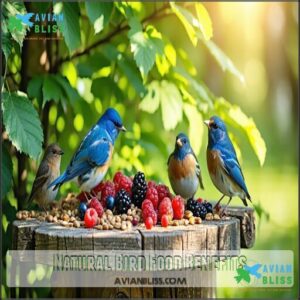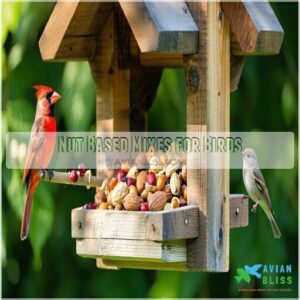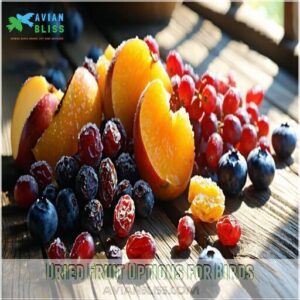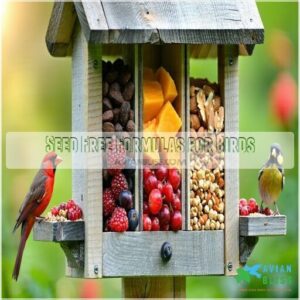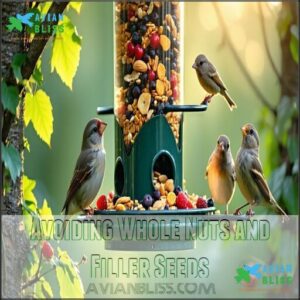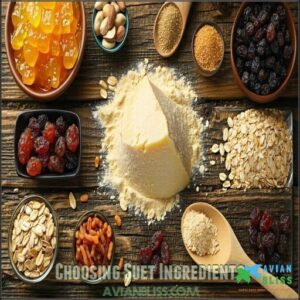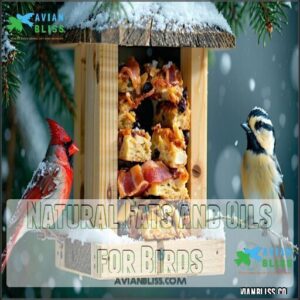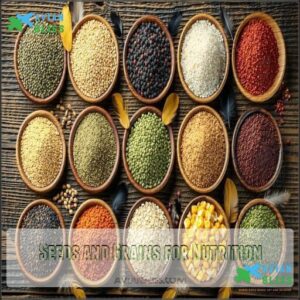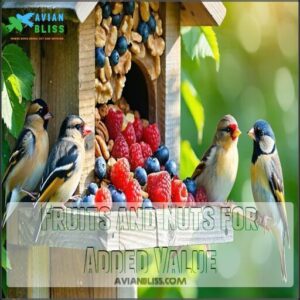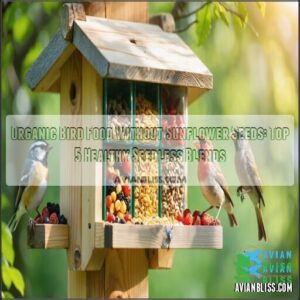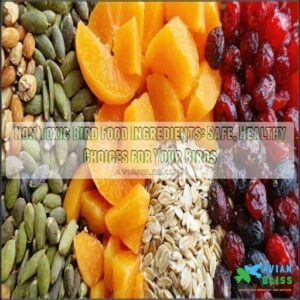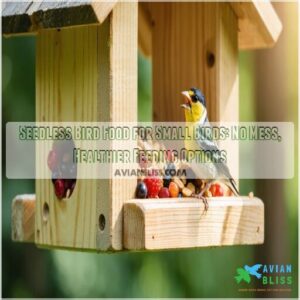This site is supported by our readers. We may earn a commission, at no cost to you, if you purchase through links.
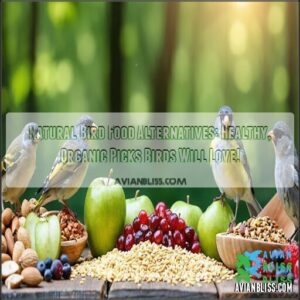 If you’re exploring natural bird food alternatives, you’ve got plenty of healthy, organic options.
If you’re exploring natural bird food alternatives, you’ve got plenty of healthy, organic options.
Birds thrive on variety, so try nutrient-packed choices like millet, sunflower hearts, or nyjer seeds.
Adding dried fruit, like raisins or cranberries, provides a sweet, energy-rich treat, while unsalted nuts deliver essential fats and protein.
Mealworms are another great pick—they’re a protein powerhouse and perfect for insect-loving birds.
Skip fillers like cracked corn or whole peanuts, which don’t digest easily.
For something extra fresh, offer chopped apples or berries.
These natural foods support vibrant plumage and lively behavior.
Curious about making homemade mixes? Stay tuned for ideas!
Table Of Contents
- Key Takeaways
- Natural Bird Food Benefits
- Top 5 Natural Bird Foods
- Seedless Bird Food Options
- Making Homemade Bird Food
- Frequently Asked Questions (FAQs)
- Can you make homemade bird food without seeds?
- What’s a good alternative to a bird feeder?
- What do birds eat if they leave the nest?
- Can birds eat non-seed food?
- Are native plants a good bird feeder alternative?
- Do birds eat sunflower seeds?
- What is a good alternative to bird food?
- What can be used as bird food?
- What is the best homemade bird feed?
- How do you keep a bird feeder healthy?
- Conclusion
Key Takeaways
- Give birds variety with natural alternatives like millet, sunflower hearts, dried fruits, and mealworms for better nutrition and energy.
- Avoid fillers like whole peanuts or cracked corn since they’re hard to digest and don’t add much value.
- Organic options, like USDA-certified seed blends, boost birds’ health with fewer chemicals and added nutrients for vibrant feathers and energy.
- Store food in airtight containers to keep it fresh, prevent spoilage, and protect against pests and moisture.
Natural Bird Food Benefits
You’ll find that natural bird food offers a cleaner, healthier option for supporting wild birds’ nutrition.
Organic alternatives guarantee fewer chemicals, better nutrient absorption, and long-term benefits like brighter plumage and more energy, which can be considered a key aspect of long-term benefits.
Organic Alternatives for Birds
Organic bird food isn’t just feed—it’s a pledge to your feathered friends’ health. By choosing chemical-free diets, you’re protecting delicate bird systems and boosting their overall wellness.
Choosing organic bird food means prioritizing clean nutrition, protecting delicate systems, and ensuring vibrant, thriving feathered friends effortlessly.
- Certified Organic blends, like USDA-certified options, guarantee natural, balanced nutrition.
- Eco-Friendly Feeding practices guarantee sustainable support for wild birds.
- Organic Seed Types, from pesticide-free millet to flaxseeds, offer a rich, nutritious alternative.
These options often promote cleaner diet benefits for long-term health. Invest in natural bird feed for long-term health and thriving avian companions.
Healthier Plumage and Energetic Behavior
The food you pick shapes your bird’s life.
Nutrient-rich seeds, fruits, and grains improve plumage color and energy levels.
Vibrant plumage and glossy feathers come from a diet boosting feather quality during molting health.
Watch activity patterns brighten with the right mix! Healthier foods mean healthier birds, showing livelier behavior that’s impossible to miss.
USDA-Certified Organic Blends
If you’re serious about your bird’s health, USDA-certified organic blends are a must.
These natural bird food alternatives promise a chemical-free guarantee, meeting strict certification standards for purity and safety.
With sustainable sourcing and nutritional advantages, organic blends like flaxseeds, quinoa, and amaranth elevate well-being.
Choose from varied blends that fit every bird’s needs, ensuring their diet stays clean, balanced, and packed with energy.
Airtight Containers for Freshness
Keep your bird food fresh like a pro with airtight containers, the ultimate tool for nutrient preservation and bird food storage.
These containers are your defense against common threats:
- Moisture Prevention: Moisture can ruin freshness, stripping essential nutrients.
- Oxygen Control: Oxygen speeds up food spoilage, reducing shelf life.
- Sealing Methods: Poor sealing increases contamination risks from pests or mold.
Choose food-safe, high-grade materials designed for humidity, pest protection, and bird food freshness.
Good storage keeps your bird friends safe from spoiled food and guarantees every bite meets their health needs effortlessly.
Top 5 Natural Bird Foods
You’ve got plenty of natural, nutrient-packed bird food options to keep your feathery friends healthy and happy.
From seed mixes to no-waste blends, these choices prioritize nutrition and minimize harmful chemicals.
1. Parrot Bird Food Seed Mix
The Parrot Bird Food Seed Mix is a smart pick for meeting your parrot’s nutritional needs.
A balanced blend of seeds and fruits perfect for vibrant feathers, boundless energy, and a happy, healthy parrot lifestyle.
Packed with safe parrot seeds like safflower, buckwheat, and almonds, it’s designed to deliver balanced nutrition without toxins or artificial additives.
This natural bird food alternative includes green peas, banana, and corn, offering variety that parrots love.
With 12% protein and essential minerals like zinc and calcium, it fuels health, energy, and vibrant feathers.
If you’re exploring birdseed alternatives, this mix guarantees your feathered friend gets everything they need for a happy, active lifestyle.
2. Wild Bird Seed No Waste Mix
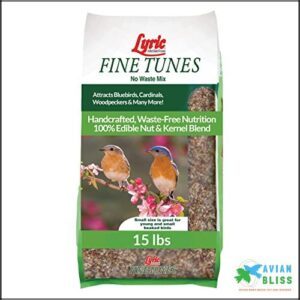
Your backyard visitors will happily flock to the Wild Bird Seed No Waste Mix. This blend balances nutrition and cleanliness, offering premium shell-free nutrition for birds while leaving no mess behind.
Packed with hulled millet, sunflower seeds, and peanut pieces, this mix is ideal for attracting cardinals, jays, and chickadees. It’s a fantastic option for birdseed alternatives, especially for those wanting a neater space.
- Reduced waste means less cleanup.
- Provides nutrient-dense, seed-free feeding.
- Attracts a wider variety of wild birds.
- Boosts cost efficiency by eliminating fillers.
- Available in convenient sizes to suit your feeders.
3. Wild Bird Nut And Fruit Blend
Transform your feeders into a gourmet haven with the Wild Bird Nut and Fruit Blend—a perfect mix of nutrition and variety.
This thoughtfully crafted blend combines wild bird nuts, shelled sunflower seeds, and dried fruits like cranberries, cherries, and blueberries for maximum appeal.
Packed with nutritional benefits, it fuels your winged friends with energy-boosting fruits and protein-rich nuts.
The careful blend ratios guarantee balance, meeting diverse bird preferences across seasons.
With zero waste, this mix attracts vibrant species like woodpeckers, cardinals, and finches, all while sidestepping messy shells.
It’s an ideal choice for anyone wanting effortless feeding and healthier, happier birds.
4. Wild Delight No Waste Birdseed
Wild Delight No Waste Birdseed is a game-changer in the context of keeping your feeders tidy and birds healthy.
This no waste mix features shell-free ingredients like sunflower kernels, peanuts, and pistachios, ensuring your feeding area stays cleaner while providing a nutritional boost for your feathered companions.
With its seedfree formula, this blend eliminates filler seeds and messy shells, a practical choice for bird enthusiasts who value efficiency.
Beyond convenience, the ingredient analysis highlights that each component delivers essential vitamins and minerals that support vibrant plumage and energetic behavior.
Though a bit pricier than standard seed mixes, its no-waste benefits justify the investment, as every piece of seed is consumed.
This mix appeals to a variety of birds, including cardinals and jays, making it versatile.
Proper storage, like airtight containers, preserves its freshness for long-term use.
5. Organic Non Gmo Chicken Feed
If you’re worried about GMO concerns and want the best for your flock, USDA-certified organic, non-GMO chicken feed is a game-changer for chicken health.
This feed provides 16-17% protein and essential nutrients, like vitamin D, manganese, and oyster shell calcium, to support robust egg production and overall wellness.
Available in pellet, crumble, or mash forms, it’s a versatile, natural bird diet option designed for healthy, energetic chickens.
Many owners are now exploring non-GMO options to guarantee superior bird health.
- USDA-Certified Organic: Guaranteed no harmful chemicals or GMOs.
- Rich in Calcium: Supports stronger eggshells.
- Natural Seed Alternatives: Keeps diets clean and nutrient-packed.
- Promotes Egg Laying: Balanced nutrients for productive hens.
- Trusted Feed Sourcing: Prioritizes your birds’ long-term health.
Seedless Bird Food Options
Seedless bird food options help you minimize waste while offering birds concentrated nutrition from natural ingredients like nuts and dried fruits.
These blends are ideal for maintaining cleaner feeding areas and supporting birds with high-energy, protein-rich alternatives.
Nut-Based Mixes for Birds
Nut-based mixes bring nutritional benefits for birds, offering a protein-rich option that’s perfect for attracting species like woodpeckers, chickadees, and nuthatches.
Blends with peanuts, walnuts, and almonds provide healthy fats that support vibrant feathers and energy. Mix ingredients, like sunflower seeds and peanut butter bird food, make these options irresistible.
You can explore options for various bird blends to find the perfect mix.
Store these nut and fruit blends in airtight containers to prevent spoilage and preserve freshness. With smarter storage and thoughtful choices, keeping birds happy doesn’t break the bank.
Dried Fruit Options for Birds
Boost your feathered visitors’ meals with dried fruit options packed with nutritional value.
Birds love a flavorful variety, and safe fruits make a world of difference:
- Cranberries: Perfect for attracting cardinals and finches.
- Juniper Berries: A favorite snack for chickadees and woodpeckers.
- Raisins: Great for ground-feeding blackbirds and robins.
- Papaya: Engages curious nuthatches and woodpeckers.
Consider sourcing quality options for your birds.
Moistening fruits enhances their texture, creating irresistible treats while matching Bird Preferences.
Seed-Free Formulas for Birds
Looking for clean feeding with high nutrient density? Seedfree formulas like nutbased mixes and protein pellets pack the punch your birds need.
Try suet feeders paired with insect-based foods to reduce mess while offering excellent protein.
Add variety with dried fruit options that birds love!
These natural bird food alternatives keep feeders tidy and birds healthy without relying on traditional seeds.
With seedless bird food, your feathered friends stay vibrant, energetic, and well-fed without unnecessary filler or hassle.
Avoiding Whole Nuts and Filler Seeds
Choosing seedless bird food helps avoid feeder blockages and supports small bird safety.
Whole nuts often clog feeders and create choking risks. Opt for seedfree formulas with chopped pieces or nutbased mixes to reduce waste.
Filler seeds, like milo, add bulk without nutrition. Prioritize blends without fillers, ensuring birds enjoy nutrient-packed meals while you keep feeders flowing freely and securely.
For peak health, small birds also benefit from high energy foods, which provide them with the necessary energy to thrive in their environment, supporting their overall well-being and allowing them to enjoy nutrient-packed meals.
Making Homemade Bird Food
Making homemade bird food lets you control ingredients and provide healthier, natural options for your feathered friends.
By combining seeds, grains, fruits, and fats, you can create balanced, nutrient-rich blends that support their energy and well-being, and provide them with natural options.
Choosing Suet Ingredients
Homemade suet is a nutritional treasure trove for birds, offering a dense energy boost.
The right mix of suet ingredients guarantees superior nutrition. Start with beef fat as the base and blend in extras for variety:
- Fat Sources: High-quality beef fat or natural fats like lard.
- Binding Agents: Unsalted nuts, dried mealworms, or oatmeal.
- Seed Additions & Fruit Inclusion: Raisins, sunflower seeds, or millet.
Homemade suet provides high calorie bird food that’s beneficial, especially during colder months.
Avoid harmful fillers like overly processed sugars, guaranteeing safer, healthier meals.
Natural Fats and Oils for Birds
When crafting homemade suet or bird food, using the right natural fats is like giving birds their ultimate energy boost. Think peanut oil, coconut oil, and rendered fats—these are safe, high-calorie options ideal for winter feeding and supporting feathered friends’ well-being.
Coconut oil is a suet alternative with immune-boosting power and essential fats, perfect for smaller birds. Peanut oil packs high energy, making it a favorite for woodpeckers. Rendered fats, like bacon grease, provide critical calories for survival in colder climates.
Consider various bird food oils to enhance your homemade recipes. However, always avoid fats that melt too easily, as they can compromise feather waterproofing.
Birds benefit from fats as well as for their vitamin absorption and metabolism. With the right choices, your feeders can become a winter haven of nourishment and health.
Seeds and Grains for Nutrition
Seeds and grains are like energy-packed snacks for birds, offering nutrients that fuel their daily activities.
They’re small but mighty in their nutrient-rich goodness, making them a vital part of a balanced diet.
- Flaxseed Benefits: Boosts omega-3s for shiny plumage.
- Millet Varieties: Perfect for energy and versatility.
- Quinoa Nutrition: A protein powerhouse for health.
- Hemp Seeds: Loaded with fats and essential minerals.
- Cracked Corn: Affordable and loved for easy digestion.
Nature’s grains truly support your feathered friends’ overall well-being!
Fruits and Nuts for Added Value
Boost your bird’s health with fruits and nuts for added nutrition! Fruits like berries provide essential nutrients, while nuts such as almonds and walnuts deliver protein and energy.
Chop fruits into small pieces, ensuring freshness, and use unshelled options for convenience. Always avoid salt, which is harmful to birds, and stick to natural ingredients.
Homemade mixes combining fruit nutrition and nut proteins create balanced meals for vibrant bird health. These high-energy foods attract diverse species, supporting both flavor and bird nutrition.
Get creative using fruits for birds, nuts for birds, and other safe, natural options to keep your feathered friends thriving!
Frequently Asked Questions (FAQs)
Can you make homemade bird food without seeds?
Imagine coating a pinecone in peanut butter, rolling it in crushed nuts or dried fruits.
It’s an easy, seed-free way to feed birds, offering natural fats and sugars for energy and nutrition.
What’s a good alternative to a bird feeder?
Hang a shallow dish, try a repurposed basket, or use a small tree branch to sprinkle food.
Each creates cozy feeding spaces for birds, blending naturally into your yard while avoiding traditional feeder setups.
What do birds eat if they leave the nest?
Once fledglings leave the nest, they rely on insects, seeds, fruits, and nectar found nearby.
Their parents often guide them, showing how to forage for protein-packed insects or nutritious plants to guarantee survival and growth.
Can birds eat non-seed food?
Yes, birds can eat non-seed food.
Fruits like apples and berries, veggies like peas, and proteins such as unsalted nuts or cooked eggs provide essential nutrients.
Just avoid harmful items like avocado or chocolate.
Are native plants a good bird feeder alternative?
Native plants make an excellent bird feeder alternative, offering natural food like seeds, nectar, and berries while attracting insects birds love.
They support local ecosystems, require less maintenance, and guarantee a sustainable, pesticide-free food source.
Do birds eat sunflower seeds?
Sunflower seeds are bird favorites!
Packed with energy-dense fats and proteins, they fuel many species year-round.
Offer black oil sunflower seeds for wild birds, as their thinner shells and higher oil content make them easier to enjoy, with higher oil content being a key factor.
What is a good alternative to bird food?
A great alternative to store-bought bird food is homemade mixes using seeds like millet, flax, or pumpkin, unsalted nuts, and dried fruits.
You can also offer chopped fruits, cooked veggies, or unseasoned grains like quinoa.
What can be used as bird food?
You can feed birds fresh fruits like apples and berries, unsalted nuts such as almonds, or seeds like millet and sunflower.
Even cooked vegetables and grains, like peas and quinoa, offer excellent nutrition.
What is the best homemade bird feed?
It’s ironic how simple scraps create the best bird feed.
Blend peanut butter, millet, sunflower seeds, and dried fruits for exceptional nutrition.
Add bacon grease for winter suet or chopped fruits for a seasonal treat.
How do you keep a bird feeder healthy?
Clean your bird feeder regularly to prevent mold and bacteria, position it away from predators.
Replace old food frequently and offer fresh, high-quality food.
Guarantee water availability for a safe, thriving bird environment.
Conclusion
Picture a goldfinch thriving on vibrant seeds—it’s a reminder that natural bird food alternatives truly nourish.
By choosing organic options packed with nutrients, you’re supporting healthy plumage, energy, and overall bird wellness.
From protein-rich mealworms to dried fruits and unsalted nuts, these picks go beyond filler seeds, offering real value to your feathered visitors.
Whether you opt for store-bought blends or homemade recipes, providing fresh, wholesome foods fosters a lively, colorful garden full of happy, healthy birds.

